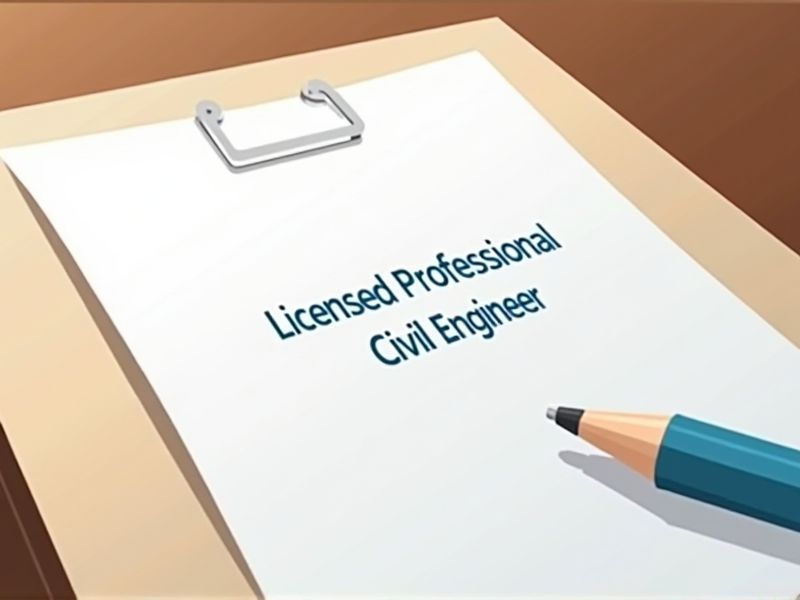
Licensed Professional Civil Engineers often face complex projects that require specialized expertise and credentials to ensure safety, compliance, and efficacy. Specific certifications validate their skills in areas like structural analysis, environmental sustainability, and project management, directly impacting project outcomes. Holding these certifications means demonstrating knowledge and competence in current industry standards and technological advancements. Here are some important certifications you may need as a Licensed Professional Civil Engineer.
Professional Engineer (PE) License
A Professional Engineer (PE) License is mandatory for civil engineers to legally approve, sign, and seal engineering plans and documents, ensuring compliance with regulatory standards. Possessing a PE License enhances credibility and trust with clients and employers, indicating proficiency and adherence to industry standards. Certain engineering roles and projects, especially those involving public safety and infrastructure, require a PE License for accountability and liability purposes. Obtaining and maintaining a PE License often leads to broader career opportunities and potential for higher earnings within the engineering field.
Engineer in Training (EIT) Certification
The Engineer in Training (EIT) certification serves as a foundational step for aspiring Professional Civil Engineers, as it validates fundamental engineering knowledge. Obtaining this certification is often a prerequisite for sitting for the Professional Engineer (PE) licensure exam, ensuring candidates have a baseline competency. Many states require the EIT for civil engineers to gain necessary work experience under a licensed engineer, crucial for practical skill development. EIT certification signals to employers a serious commitment to the engineering profession, enhancing job prospects and professional credibility.
Fundamentals of Engineering (FE) Certification
The Fundamentals of Engineering (FE) Certification is necessary for ensuring an engineer has achieved a certain level of knowledge in their field. Completing the FE exam acts as a prerequisite step towards obtaining a Professional Engineer (PE) license. The certification serves as a standardized measure of technical competence that helps to maintain public safety and industry quality standards. Possessing the FE certification can enhance an engineer's credibility and career opportunities in the civil engineering industry.
LEED Green Associate Certification
The LEED Green Associate Certification equips a Licensed Professional Civil Engineer with comprehensive knowledge on sustainable building practices, essential for modern construction. This certification enhances their ability to design projects that minimize environmental impact, which is increasingly demanded by clients and regulatory bodies. With sustainability becoming a crucial aspect of infrastructure development, having LEED certification increases a civil engineer's marketability and competitiveness in the job market. As environmental regulations become more stringent, the certification provides engineers with a set of tools and frameworks needed to meet these new standards efficiently.
LEED Accredited Professional (LEED AP) Certification
The LEED Accredited Professional (LEED AP) Certification signifies a civil engineer's expertise in sustainable design and construction practices, enhancing their project proposals. Civil engineers with this certification are better equipped to meet the growing demand for environmentally responsible projects, leading to competitive advantages in the job market. Projects overseen by LEED AP-certified professionals often achieve higher energy efficiency and lower environmental impact, aligning with industry trends toward sustainability. In the context of stricter regulations on building sustainability, this certification aids licensed engineers in ensuring compliance with green standards, potentially reducing legal and financial risks.
Project Management Professional (PMP) Certification
Earning a PMP Certification can enhance a licensed Professional Civil Engineer's ability to manage large-scale construction projects, as it provides rigorous training in project management methodologies. It increases their marketability in the job field, as many employers prefer or require PMP-certified engineers for senior project management roles. Certification also helps engineers ensure projects are completed on time and within budget, reducing potential legal and financial repercussions. PMP Certification fosters leadership skills and the ability to effectively communicate with multidisciplinary teams, essential for complex civil engineering projects.
Certified Construction Manager (CCM) Certification
Licensed Professional Civil Engineers often pursue the Certified Construction Manager (CCM) Certification to demonstrate a specialized skill set in managing complex construction projects. The CCM Certification enhances credibility and trust with clients, as it signals adherence to industry standards and best practices. Earning this certification can lead to greater career opportunities and potential salary increases due to the demonstrated commitment to professional growth. The certification process equips engineers with advanced project management techniques, improving overall project efficiency and outcomes.
OSHA 30-Hour Construction Safety Certification
The OSHA 30-Hour Construction Safety Certification enhances a civil engineer's knowledge of workplace safety regulations. This certification provides critical insights that can minimize the risk of job site accidents. With this credential, the engineer is better equipped to oversee safety compliance, which often impacts project timeliness and cost. Employers increasingly require it to ensure engineers can actively contribute to creating safer construction environments.
Certified Floodplain Manager (CFM) Certification
Obtaining the Certified Floodplain Manager (CFM) certification equips licensed professional civil engineers with specialized knowledge in floodplain management and mitigation strategies. This expertise enhances their ability to design and implement infrastructure projects that minimize flood risks, comply with federal regulations, and protect public safety. The certification also demonstrates a commitment to staying current with industry standards, which can result in increased professional credibility and competitive advantage in the field. By integrating floodplain management principles into civil engineering practices, engineers contribute to more sustainable and resilient community planning.
Certified Erosion and Sediment Control Professional (CESP) Certification
The CESP Certification equips civil engineers with a specialized understanding of erosion and sediment control best practices, which enhances project site sustainability. It addresses regulatory compliance needs, reducing the risk of project delays and legal issues related to environmental impact. The certification increasingly aligns with client and industry demands for eco-friendly and responsible engineering practices. Possession of CESP credentials signifies commitment to advancing professional development and expertise in environmental stewardship.
Summary
As a licensed professional civil engineer, pursuing certifications can enhance your expertise and career prospects. Certifications lead to increased job opportunities and potential for higher salary. They provide a deeper understanding of specialized areas within civil engineering. Emphasizing professional development often results in improved project outcomes and client satisfaction.
